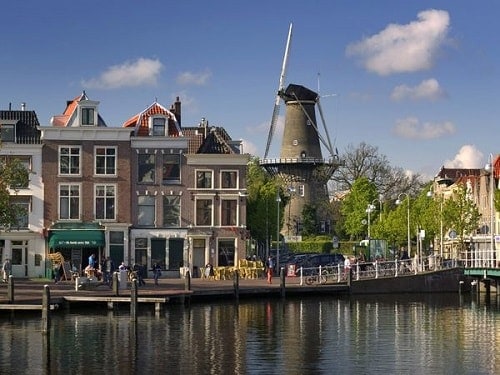VISA AND IMMIGRATION
POST STUDY WORK VISA
With World Politics going through a massive upheaval, going to study abroad has an added dimension: “The Post Study Work Visa”. Never heard of it? Don’t worry, because, in the next few paragraphs, you will find a detailed explanation of everything there is to know about it. Promise.
WHAT IS A POST-STUDY WORK VISA?
Well, to put it in easy terms, a post-study work visa is the permission given by any country to immigrants (read: students) to continue working as a full-time worker in that country’s local job market, post their education from the country itself.
Clear now? If so, then let’s go ahead to the next doubt that may be keeping you occupied.
HOW TO GET HOLD OF A POST-STUDY WORK VISA? WHAT IS THE PROCEDURE?
Different countries have different rules regarding procurement of such post-study work visa. Some countries which are rather lenient about allowing foreign students to stay back after their graduation and work alongside the local people, have a fairly easy process and is pretty achievable with some paperwork at most.
Others, which are strict about maintaining their job market integrity, can make life difficult for you by complicating and twisting the VISA process, to the extent, where you can no longer ask for one yourself, but rely on your future employer (if any) to “Sponsor” your work Visa.
Crazy, right? 😛

This is exactly one of the reason, why we as admission consultants, have decided to come forth and publish what we prefer to call as the “Immigration Handbook for International Students” (Could not come up with a better name!). Our aim is to ease out the post-study work visa process for you.
The following guide gives you more or less the important details, such as tenure of Visa, Renewal of Visa, Terms, and Conditions of the VISA, Eligibility Conditions for the VISA and any other details which are important to you as a student. Get Reading!
IMMIGRATION REGULATION: A COUNTRY WISE DESCRIPTION
Click below for country-specific regulations


The Australian Graduate Migration Scheme has the following details:
ELIGIBILITY CRITERIA IN AUSTRALIA
1.For a post-study work visa in Australia, International Students must graduate with one of the following:
- Bachelor (Honours) qualification
- Masters or Masters Research Qualification
- Doctoral (PhD) qualifications2.International Students must have at least 2 years of academic Study in Australia at either the Bachelors, Masters or Doctoral level. Graduate Diploma Holders aren’t eligible.
NOTE: The subject area of the field of study does not affect the students’ eligibility for a post study work visa. So a Masters in CS will also grant you a post-study work visa in Australia and so will a PhD in Medicine, as long as the degree obtained is recognized.
DURATION OF THE VISA IN AUSTRALIA
The duration of the work Permit is dependent on the following:
- Students with a Bachelor Degree: 2 year
- Students with a Master’s Degree Coursework: 2 years
- Students with a Master’s by Research Degree: 3 years
- Students with a Doctoral Degree (PhD): 4 years
- Students have received a minimum of 6 in each band of IELTS exams
TERMS AND CONDITION FOR POST STUDY WORK VISA IN AUSTRALIA
- Only Courses that are registered on the CRICOS (Commonwealth Register of Institutions and Course for Overseas Students) and completed at eligible universities or education providers in Australia that are accredited to offer such degrees will be deemed eligible.
- Only Standard time of obtaining a degree will be referred to as the duration of study period. If a student takes longer to finish his/her degree due to any unforeseeable circumstance, the extended period won’t be considered.
- Graduate Diploma Holders aren’t permitted to apply for a post-study work visa in Australia. However, if a graduate diploma is done followed by a masters/ doctoral degree, the duration of the diploma will be counted towards it.
- Multiple Masters won’t have any cascading effect to your Work Permit Duration. So if you do a double Master’s degree inside two years, you will still be applying for a 2 Year Work Permit.
For more details, visit.
JOB SCENARIO IN AUSTRALIA:
Those who want to pursue a job as a Financial Analyst, Site Manager, Data Analyst, Development and Operations engineer and Sales manager, will be happy to know that Australian Job Market has a huge demand for these sectors right now as you are reading this blog.
Other areas of booming job opportunities include Architecture, Supply Chain Manager, Lawyers and Senior HR Professionals. Also, IT sector in Australia is a major economic booster for the country and as such, skilled migrants with the technical know-how are in great demand. Consult the SOL (Skilled Occupation List) to make sure you are going for a masters in a related field, or else, it might be difficult to land a job as an immigrant.
Good Communication Skills (Don’t take this lightly, Australians are spot on with their English) and excellent set of soft skills such as Presentation, Leadership ability, etc. are a huge plus, even in the IT Sector.
Australia has two of its cities, Sydney and Adelaide amongst the happiest places to reside in the world, and even though Australian education is pretty costly, but once you manage to land a job, it eases everything.
Read more about the Australian work culture here.
VERDICT:
It is a country that can be kept as a definite back up option, in case someone wants to explore areas outside EU and USA. Australia has a stable economy and a fairly open job market, thanks to the fact, that it wasn’t affected hugely by any of the economic meltdowns. It is considered one of the best countries to live in, so all the effort that you may have invested in obtaining a post-study work visa in Australia will pay off. So if you have very good English Speaking Skills, and do not mind spending some big bucks for your masters, Australia is definitely something you should consider.


For a post-study work visa in Canada, candidates can pursue Graduation Work Permit Programme (PGWPP). The following are the details regarding the same:
ELIGIBILITY CRITERIA IN CANADA
1.Students need to study full time in Canada for at least 8 months
2.Students need to have graduated from :
- Public post-secondary institution, such as a college, trade/technical school, university or CEGEP (in Quebec)
- Private post-secondary institution that operates under the same rules and regulations as public institutions
- Private secondary or post-secondary institution (in Quebec) offering qualifying programs of 900 hours or longer leading to a DEP(Diploma Etudes professionnelles) or ASP (Attestation de specialisation professionnelle)
- Canadian Private Institution authorized by provincial statute to confer degrees, but only if you are enrolled in a program that leads to a degree authorized by the province.3.Students must apply within 3 months of receiving written confirmation from the institution indicating that he/she has met the academic requirements of completing the academic programme
4.Students must complete and pass the program o study they are presently enrolled in and received a notification regarding their eligibility of obtaining their degree corresponding to their course.
DURATION IN CANADA
- The PGWPP offered is never more than the length of your course duration. That is, if someone does a master’s degree for 9 months in Canada, he/she can be eligible for a work permit no more than 9 months in duration.
- Course Duration < 8 months : No work Permit
- Course Duration > 8months and < 24 months: Work Permit no longer than the course duration.
- Course Duration > 24 months: 3 Years of Working Permit may be issued.

TERMS & CONDITIONS IN CANADA:
1.Students who have received partial or full grants from the following scholarship scheme are not eligible to apply for PGWPP:
- Students who participate in a Canadian Commonwealth Scholarship Programme funded by Global Affairs Canada (GAC).
- Participants in a Government of Canada Awards Program Funded by GAC.
- Recipients of funding from Canadian International Development Agency (CIDA).
- Participants of Canada-Chile Equal opportunity Scholarship.
- Participants of Canada-China Scholars Exchange program.
- Participants of Organization of American States Fellowships program.
- Participants of Distance Learning Programme either from Abroad or from within Canada2.Students must be 18 years or older at the time of application for PGWPP.
3.Students must provide a supporting letter from your institution outlining the duration of the studies and the program code.
4.Recipients of PGWPP following any other programs of study, previously, are not eligible for reapplying to the same scheme.
JOB SCENARIO IN CANADA:
One of the most booming job markets in the world, Canada has an unemployment rate ~7% which is way less than in other countries.
More importantly, Canada at this moment is having several domains where there is skill shortage such as Data Analytics, IT, Trade (Commerce) and Health Care and graduates who want to enter into Professional services, are very welcome to go to Canada to procure a work-permit and work over there.
In order to attract more talented people across the globe, Canada has introduced relaxed PR regulations and is right now very immigrant friendly.
Locations like Vancouver, Calgary, Montreal and Toronto are game! Plus, if you are a polyglot with very good English and French language proficiency, then the prospects are umpteen for you!
VERDICT:
If you can handle the harsh winter of Canada, and don’t mind learning French (Not Mandatory though) then there is no reason why Canada should not be in your list to watch out for. With world class universities, excellent work-life balance and great job opportunities, it is definitely on the cards if you want to work for some time after your masters!


Students who go to France for pursuing their higher education are entitled by the French government to remain in France post-graduation, under a “Temporary Residency Authorisation” (aka ASP) that allows them to stay after completion of their course for professional reasons. This is however non-renewable.
An alternate Residency Permit is also issued by the French Government called “Plurennial Residence Card” aka “Passeport Talent”. This is to facilitate entry of International Talents into France. This gives a right to have a job. Given below are all the necessary details regarding the different schemes:
ELIGIBILITY CRITERIA IN FRANCE
1.International Non-EU Students must pursue any of the below mentioned three degrees to benefit from the ASP:
- Degree equivalent to a Master’s
- Degree categorised as level I by the “Conference of Grandes Ecoles”, which is equivalent to a 5 year studies course
- Professional Licence2.The ASP allows students to work in jobs in relation to his/her study course.
3.The job attained by the student must pay at least equivalent to 1.5 times the “SMIC”, i.e. minimum legal wage. Also, a student for obtaining the student Visa must be able to provide enough financial support to fend him/her during their stay, minimum being 615 euros/month.
4.The ASP is also given to entrepreneurs for starting their own company.
5.For the Passeport Talent Scheme, in order to be eligible, international students must meet the following criteria: - Young graduated qualified employees or employed in an innovative companywhere the student has to be a holder of a degree equivalent to Master’s, issued by a national compliant higher education institution. Students must be holders of a work contract superior to 3 months. The annual gross wage for the job has to be at least equivalent to 2 times the minimum legal wage.
- Company Creators
Holders of a degree equivalent to a master’s and able to prove an investment of at least 30,000 euros in a company project. - Highly qualified workers
Holders of a degree representing 3 years of higher studies and a work contract over 12 months with a French employer with an annual gross wage at least equivalent to the equivalent to the reference average annual wage (defined by the Ministry of Immigration).
DURATION IN FRANCE
- For almost all International students (except Algerians, Indians, Congo, Cameroon, Cape Verde and Gabon: follow “NOTES” at the bottom for more info) the duration of the Temporary Residency Authorisation (ASP) is 12 months post-graduation. In order to extend their stay in France after the 12 months so provided, International Students will have to apply for a “Status Change” (read more about this in the Terms and Conditions).
- The duration of residency permit for internationals who hold the Plurennial Residency Card is 4 years, and not only that, the Residency Card allows them to keep their family in France as well for the duration.
TERMS AND CONDITIONS FOR POST-STUDY VISA IN FRANCE
(Related to extending the ASP)
1.The rule for extending your ASP is simple. You have to apply for a “Status Change”, i.e. upgrade your status from a student to one of the following:
- Student –> Employee for those student who can prove an employment contract in relation with their study course.
- Student à Auto-Entrepreneur for students who want to start their own company. Field of work must be related to the study course followed and the viability of the company must be proven.2.For Indian Students only, there is however, very good news. Due to the recent bi-lateral student exchange programme signed by our very own PM Narendra Modi, Indian students under the ASP are eligible for a 24 month post-study temporary residence visa instead of the 12 month tenure. This is done to ensure more number of student exchange between the two countries.
3.For Algerians as well, along with Congo, Cameroon, and Gabon the scene is quite rosy. Due to their bilateral agreement with France, the nationals from these 3-4 nations, are entitled to some extra facilities and benefits inside the ASP, and as such the non-renewable aspect of the ASP doesn’t apply to them
For more information, visit Campus France
JOB SCENARIO IN FRANCE:
It is one of the better places in EU to work at. Even though French Unemployment rate is marginally higher compared to the EU average, but graduates from top universities are not to be considered for such a scenario and most of them manage to land pretty decent jobs.
Banking, R&D, IT & Engineering are some of the fields that have witnessed the maximum growth.
The average work week in France is 35 hours which is significantly less than the world average. Plus, 5 weeks of paid annual leave is granted to each French employee.
Finding a job becomes easy if you have good French Language Proficiency and also the French Income is taxed based on 5 different bands with 0% tax for incomes below 9,500 euros and 45% for an yearly income of 150,000+ euros.
VERDICT:
Definitely worth it. It is not exactly easy to land a job in France, but then it really depends on how much effort you put in. So if you aren’t repulsed by the idea of learning and speaking French, or like the French Cuisine and Culture, then it should be one country to watch out for. Plus who wouldn’t want to study in a country whose capital featured as the “Best Student City in the world” for 3 years and which has 3 out of the 4 Best MIM Programmes in the world to itself? 😛


EU students can enter Italy and study there merely with the help of a passport. Yes. It’s that simple for the non-Italian EU students to study in Italy. No Separate Student Visa required.
Coming to the not so lucky non-EU international students who wish to study in Italy—they will have to apply for a student visa in order to pursue their higher education.
However, All international students will have to register themselves at the nearest Police Station (Questura) in order to obtain what is called the “Residence Permit” within 8 working days of their arrival in Italy.
ELIGIBILITY CRITERIA ITALY
- Student applying for the VISA, must have an admission letter from one of the Italian Universities, as well as a valid passport (Preferably with two blank VISA Page).
- Students should not have any criminal records against their name.
- Students must provide financial documents to prove that they can sustain themselves during the entire study period.
- This is something bizzare, but in order to be eligible to be granted a VISA, students must furnish their flight itinerary, showing the purchase of a valid return ticket and enough money to be able to travel back to your country.
DURATION IN ITALY
- The Student VISA issued is generally for the course duration only. However for non-Italian EU students, since they only require residence permit, they can work in Italy for as long as they want, but with a valid residence permit.
- Non-EU students enrolling for only PhD. And 2nd degree Masters (ECTS of 120) can apply for a temporary residence permit once their study permit for the course duration gets over, which is an extension of 6-12 months.So it is important to land a job within the expiry of the VISA. Or else, pack your bags and head home!
TERMS AND CONDITIONS FOR POST STUDY WORK VISA IN ITALY
- To apply for a temporary stay permit extension, one must show economical capability of at least 8,500 Euro in your bank account and proof of a valid housing contract issued by the Municipality.
- Students can only work up to 4 hours a day and 20 hours per week while on a study VISA, and can work full time during Vacations. Anything more than that, and the student will have to convert his student visa into a work permit.
- For internship post-graduation in Italy, students will have to ask for a renewal of student residence permit, at the Questra, and this doesn’t guarantee an automatic renewal. So beware while applying for internship. Also, Internship period cannot be longer than 12 months.
For more information, visit here.
JOB SCENARIO IN ITALY:
The Italian Job Market is counted to be one of the slowest growing economies in EU, thanks to the economic meltdown in the last decade. Ever since, Italian economy has been struggling to find a footing.
Unemployment is at a rise, as well as the cost to start-up an enterprise is really very high thanks to taxes and red tape.
Productivity is going downhill in Italy, with construction, banking and service sectors being the worst hit of the lot. Also, no unemployment benefit is given as such.
Read more about the work culture of Italy here.
VERDICT:
For the time being, Italy should not be kept as first preference for those students who want to work for some time after completion of their masters. The Job Market is not really projected to turn around big time in the coming years or so. Hence, if you are really into Italian culture or food, or want to stay In Italy to pursue an Italian masters, best bet will be to learn Italian before-hand and aim for only the top most universities.


For Germany, the process is as easy as it gets. For EU students, there is no need for any student Visa or residence permit in order to study or enter the German Labour Market, owing to the Freedom of Movement amongst EU Partner countries.
For non-EU Students, the situation is not so bad either! Generally, students pursuing their degree at any authorised German Higher University, are given residence permit for the duration of their course, following which, another extension of the permit is given to facilitate the job search.
Apart from this, there are basically four types of Visa, the German Residence Visa for studying, Visa for Jobseekers, the EU Blue Card Work Visa and the Visa for the self-employed. Below are the eligibility criteria for the same:
ELIGIBILITY CRITERIA IN GERMANY
- The eligibility of a German Student Visa is pretty straightforward wherein a student has to furnish a document saying that he/she has been accepted into a German University.
- He/She has to show sufficient funds to support him/her during the stay.
- For the EU Blue Card, a person has to show that he/she is currently employed in a job in Germany and has an annual gross salary of more than 49,600 Euros.
- For the Self Employed Visa, a student has to abide by the following:
- There is commercial interest or regional demand for your products or services.
- Your business activity is likely to have a positive impact on the economy.
You have secured financing for your business by way of capital or a loan commitment.
- For the internship Visa, only the non-EU students need to furnish the agreement between the student and the German company, and also, the company has to apply to the BA on your behalf, and only after they allow you to carry on, will u become eligible to work as an Intern in Germany.
- For being eligible to obtain a job-seeker visa, you have to provide with proof of adequate funding, to sustain you during your stay at Germany and also must have a degree equivalent to that of the German Degrees.
DURATION IN GERMANY
- The study Visa for pursuing any higher education courses, such as Masters/PhD, is a 2 year permit given to the students, which can be even extended under special circumstances.
- The Study Visa can be further extended upon graduation to make it a work permit, for 18 months, during which time a student can either work in any employment to support him/her and at the same time, go for job hunting.
- The EU Blue Card, as the name suggests, is a pretty sophisticated card, which allows students, who are eligible for one, to get a PR (Permanent Residence) status after 33 months of being an EU Blue Card holder, or get the PR in 21 months, if he/she can show a German Language Proficiency equivalent to B1 level of CFER.
- The internship Visa is variable depending on the length of it, but has an upper limit of 12 months.
- For Entrepreneurs, if their business idea turns to be a profitable one and can be proved to be up and running, one can apply for a residence permit extension of 3 years and after that, apply for a PR.
- The Job Seeker Visa duration is of 6 months.
TERMS AND CONDITIONS IN GERMANY
- Students are allowed to work during their studies for up to 120 full or 240 half days annually.
- Some internships do not require the agreement of the BA. These include internships under EU-funded programmes (Leonardo, Socrates, Erasmus, etc.).
- If you are over 45 years old and applying for a self-employment Visa, a residence permit will only be issued to you if you can also provide proof of adequate provision for old age.
JOB SCENARIO IN GERMANY:
When it comes to EU, hands down, the most stable and booming economy is that of Germany. The labour market is thrown open to both Germans and International alike. Excellent PR and Visa regulations make it every job seekers dreamland to be in.
However, knowledge of German is essential, but not sufficient to guarantee you success while job hunting. Besides, Germany, like their French counterpart, have 35 hour work week for several sectors now and as such boast of an excellent work-life balance.
Germany being a meritocracy to the last letter, means that people who have work ex and know German and also possess the required skill set, climb the corporate ladder pretty fast
VERDICT:
Right Now, Germany is the best option for someone who aspires to work in the EU. Relaxed Visa and straightforward PR regulation, complimented with heavily subsidized higher education and health-care plus a great work-life balance amidst a challenging and positive job market, makes it the top destination for most students.


Netherlands, being another heavy-weight member of the EU, allows EU students unrestricted access to both the Dutch Universities for pursuing higher education as well as entering the Dutch job market and staying there for as long as they like.
Unlike their lucky EU counterparts, non-EU students have to apply for what is called a “Provisional Residence Permit” aka MVV and a ”Residence Permit“ to ensure their stay for at least as long as their course duration is.
Apart from the student Visa, Netherlands offer what is called as the “Orientation Year Visa” aka “Zoekjaar” for international students who have come to pursue higher education, allowing them to extend their stay, post expiry of their student visa.
Other categories of Visa that students often take help of in order to stay back in Netherlands are the “Highly Skilled Migrant Visa” and the “Work Permit”.
The Details of eligibility and everything else is given below:
ELIGIBILITY CRITERIA IN NETHERLANDS
- For the “Zoekjaar” eligibility, a student must have studied either a Bachelor’s or Master’s Degree at an NVAO-accredited institution in Netherlands.
- For the “Zoekjaar” Visa, a student has to complete either a PG course of 12 months duration or a PhD from a Dutch University or an ERASMUS MUNDUS Master’s course
- If you are searching for a job under the “Zoekjaar” scheme, you have to find a job that pays you at least 27,336 Euros.
- For the highly skilled migrant Visa, students below 30 years of age need to furnish proof of having a job in Netherlands that pays him/her 38,141 Euro gross salary annually at least. For students above 30 years of age, the bare minimum salary required is 52,010 Euro at the least.
- You must provide proof of your health insurance in order to be eligible to apply for a residence permit under any of the schemes mentioned.
- For getting the MVV, a student has to show sufficient financial means to support him/her, with the bare minimum being 833 Euros per month.
- For the “Work Permit” however, the only eligibility you have to consider is finding a Dutch Company that is going to employ you. Generally, the “Work Permit” is arranged by the Company on your behalf.
I
In order to apply for a Work Permit, students must make sure that their employer is registered with IND.
DURATION FOR POST STUDY WORK VISA IN NETHERLANDS
- Zoekjaar: 12 months of extension offered to students who have graduated from a Dutch university to look for jobs, post expiry of their study Visa.
- The Duration of the Student Visa is generally equivalent to the duration of the course plus an additional three months for the university’s administration processes.
- The duration of the high skilled migrant Visa is for as long as you have a job in Netherlands.
- In order to apply for the Dutch PR, a foreign national must have spent 5 continuous years in Netherlands minimum.
TERMS AND CONDITIONS
- The “Zoekjaar” is non-renewable, so students must be pro-active and try to land a job before their Visa expires and apply for converting their Zoekjaar to a Work Permit.
- During the Zoekjaar, if you find any work, the employer need not apply for a work permit, as a student is allowed to work full time during this Visa span.
- For EU Students, only registering with the IND office is enough. No need of Visas. (Not true for Bulgarian and Roman nationals)
JOB SCENARIO IN NETHERLANDS
Netherland is a popular site for foreign investors and the main sectors of growth are related to agriculture, engineering and service sectors. As such, students with transferrable skills such as Management, Marketing and Bio-Engineering can find umpteen job prospects in the agro-based sector which is a great contributor to the countries prosperity.
The Dutch average 40 hours of work per week and has a national average starting wage of 27,000 Euros/annum.
However, since to obtain a work permit, every Dutch company has to prove that there is no other Dutch national more suitable for doing this job, it means you have to spot on with your skill set and knowledge of Dutch language as it can be a handy asset.
VERDICT
Compared to other European countries, most Dutch people speak relatively good English. Still, it is a good idea to use the opportunity as a student to learn Dutch – especially if you are considering working in Holland after your studies and wish to integrate in the Dutch society.
In fact, In a survey released by DutchNews.nl this month, 84% of expats rate their life in the Netherlands as good to great. The location of the Netherlands means weekend or summer trips to other European cities like Prague, Bruges, Paris and Budapest come by cheap and easy.
Many international students actually choose Netherland for their strategic location as well! A thriving economy, a proper Visa and Work Permit regulation as well as an excellent quality of life, with a more or less fairly competitive job market makes Netherlands one of the most attractive EU countries to be in.


Switzerland has always featured amongst the best countries to live in the world and for all right reasons. The country being another EU Member country, allows the EU/EFTA students to study without any Visa, unlike their non EU counterpart, who have to apply for a Visa in order to study in Switzerland aka “long term residence permit”.
Also, post-graduation, students who wish to work in Switzerland for some time, can opt for a residency permit extension to allow foreign nationals graduating from Swiss Universities to find employment.
In order to get a work permit, the employer of the student has to deal with such intricacies on his/her behalf.
Below are the details regarding the same:
ELIGIBILITY CRITERIA FOR POST STUDY VISA IN SWITZERLAND
- Students who are non-EU foreign nationals will need to apply for a student visa, for which they have to furnish acceptance letter from one of the swiss universities.
- For applying for any of the Swiss Visa’s, a student must be able to show their financial stability to sustain themselves.
- A language test (not always mandatory) is required to make sure that you can sustain yourself in a foreign country.
- In order to get the residency extension after expiry of your student visa, you will have to prove your residence in Switzerland, i.e. where you plan on staying as well as a degree completion certificate and sufficient funding to back oneself.
- In order to get the Swiss Work Permit, non-EU students will have to find a Swiss Employer, who in turn will apply for the work permit in place of him/her.
- For student visa, confirmation of payment of course fee, and students medical cover is a must to be given a study visa.
DURATION IN SWITZERLAND
- The Long term Visa provided to students is generally given as per the course duration
- The extension of residency post completion of degree, is given to a maximum of 6 months.
- The work permit is valid for as long as the candidate is an employee to the Swiss Job Market.
- For PR, however, a long duration of 10 years or so have to spent in Switzerland to obtain it.
TERMS AND CONDITIONS IN SWITZERLAND
- The residency extension cannot be extended beyond 6 months.
- The students hunting for jobs under the extension cannot work for more than 15 hours/week.
- You cannot come to Switzerland under a short term stay visa of 90 days and later convert or upgrade it to a student Visa.
- You are given a maximum of 2 weeks, to report your arrival and arrange for your residence permit from the canton migration offices
- While awaiting your residency, students will be given an attestation to open a bank account and are barred from leaving the country during that period.
- Even if you have a student Visa, you can only work upto 15 hours a week during the term and full time during holidays but that too only after you have stayed in Switzerland for 6 months minimum.
- Your family members can’t join you in Switzerland while you are still on a student visa. Only foreigners holding a PR can do so, or in exceptional circumstances such as holding confederation grants or other academics scholarites.
JOB SCENARIO IN SWITZERLAND
The unemployment is extremely low at 3% and the salaries are some of the highest paid in the world. Though a lot of people may argue that Switzerland is also one of the most costly countries to live in, but even then, the salaries are extremely high.
In fact, Switzerland is not a “Welcome-one-and-all” country like Canada or Germany, but it has a restrictive quota of allowing foreign nationals in the job market. So even though the benefits one may reap are high, but so is the competition.
Currently some 1.5 million foreigners are employed in the Swiss market and the demand for skilled labourers are mainly in the sectors of engineering and IT, Financial Analysts, Consulting, Pharmaceuticals, Banking and Business Analysts.
VERDICT
There is probably a handful of countries in the world, where everything is more or less perfect when it comes to work-life balance. Ample holidays, Paid leaves in abundance, subsidized healthcare, fantastic educational institutes with world class reputed b-schools like St. Gallen & IMD, along with very high quality of living makes Switzerland one of the major study abroad locations across the world.


The United states of America now mainly has two types of VISA for their international student cohort.
The first one is termed as the F-1 Visa, aka Optional Practical Training (OPT), mainly taken up by the majority of International Students who have chosen USA as their study abroad destination.
The other Visa is for specialised fields, aka H-1 B Visa and is the one that had all the changes lined up once President Trump came into power.
Other Visas include the J-1 Visa for exchange students and visitors and the O-1 Visa for the extra ordinarily talented person who have national and international recognition for their expertise.
Apart from this, the very popular US Green Card is also there, but to get one is equivalent to getting a lottery, nowadays. Not kidding.
All the details regarding the above mentioned Visas are given below:
ELIGIBILITY CRITERIA FOR POST STUDY WORK VISA IN USA
- F-1 Visa needs the following eligibility criteria to be met:
- Students have to document sufficient funds for sustaining themselves in the USA during their stay.
- Students must provide strong ties to their home country either via Bank Accounts, Family, Assets or Job offer.
- Students must remain enrolled full time in their programme for which they got the F-1 Visa.
2.For the H-1B Visa : - An US Employer is required who can sponsor the Visa.
- US bachelors or equivalent
- A correlation between the job and the applicants education
- An approval from the labor condition attestation from the Department of Labor.
DURATION IN USA
- The OPT under the F-1 Visa allows students to stay back for 12 months in the USA to put their knowledge into practical application. A further 17 months extension is given to students of a STEM degree, thereby allowing a total of 29 months of stay back in the USA.
- H-1 B Visa is granted for an initial period of 3 years and a further extension of 3 years is allowed. However, you cannot increase the H-1 B Visa for more than 6 years and if you have to keep on working in the USA then you may as well apply for a US Green Card
- The O-1 and J-1 Visas are both term specific visas and as such allow the applicants of these Visas a fixed short term to stay and expiry of the Visa leads to deportation.
TERMS AND CONDITIONS IN USA
- Family Members and Spouse can accompany a person on either L-1 or H-1 B or O-1 Visas by applying for a J-1 Visa, during which time they can work but their income cannot be used by the student to support him/her.
- Don’t move out of the country while your H-1 B Visa is pending
- For qualifying for an H-1 B Visa, your job must pertain to your education, else you may not be eligible for one.
- There is an upper cap of 85,000 H-1 B Visas that can be given in any specific year.
- For applying for an OPT under the F-1 Visa, on must do so within 60 days of completion of your degree.
- The Previous minimum wage for H-1 B Visa was ~60,000 USD and the recent development is aiming to push that as high as to more than 2 times of the existing one.
JOB SCENARIO IN USA
The US Job Market can be best termed as “hostile” right now towards foreign students. Even though there is no language barrier and the competition is fairly even between nationals and internationals alike, but still, employment prospects for internationals are not as good as they used to be even 4-5 years back.
Political Upheaval in the wake of President Trump has started a culture of “America First” for all employers, thereby making the competition a bit biased.
However, STEM Fields occupation faces a sort of shortage and hence MS graduates in USA, who have acquired good skill set during their programme and has hustled enough to network, have more or less found pretty decent jobs in and around the Silicon Valley region. Other free flowing trades such as Management schools have been able to place graduates in more or less good positions and therefore the situation is well poised.
VERDICT
If you want to live the “American Dream” and have your eyes set on the best American Universities and ready to take on a rather daunting task of obtaining the much prized H-1 B and the rather difficult Green Card Permits, and also buy the trade-off for an increasingly competitive job market for the security and enjoyment of leading a life in one of the most advanced countries in the world then start applying for the American Universities now.


The Republic of Singapore is an extremely attractive city-state not far from India. The economic and social development, the quality of its universities and the business infrastructure offering good employment are factors that attract Indian students to this financial hub of the Asia Pacific region. The visa regime is easy and does not impose prohibitive requirements for the issuance of student visas.
As per the latest news on post-study work visa in Singapore, here is what you need to know:
ELIGIBILITY CRITERIA IN SINGAPORE
1. Any foreigner wishing to pursue full-time studies in Singapore in a Case Trusted institution that:
- is registered with the Ministry of Education (MOE); or
- is not required to be registered with MOE but had obtained permission from the Commissioner, Immigration & Checkpoints Authority (ICA) to submit Student’s Pass applications for international students intending to take up its courses; or
- is licensed by the Ministry of Community Development, Youth and Sports (MCYS) to operate as a Childcare centre.A foreigner is exempted from applying for a Student’s Pass if he/she is a:
- Dependant’s Pass holder studying in a Government/ Government-Aided/ Independent school/ Foreign System School/ Kindergarten registered with MOE or Childcare center licensed by MCYS;
- Immigration Exemption Order holder; and
- A visitor who has been granted a short-term Social Visit Pass at the Singapore Checkpoint and wish to attend a short course that can be completed within the validity of the initial Social Visit Pass granted to him/her at the Singapore Checkpoint or 30 days, whichever is shorter. It must satisfy two other criteria, that are, the course:
1.Must be a complete module and stand-alone module of its own. Courses with multiple programme modules are excluded from this Student’s Pass exemption scheme; and
2.Must not involve hands-on practical occupational training and/or industrial attachment which have interaction with walk-in customers or be conducted at premises that are also places of business, e.g. hair salons and beauty salons.DURATION IN SINGAPORE
One to three months of stay back option is available to students. A student may be granted a short stay pass to stay a little longer. If the student wishes to stay longer to look for employment then they may also apply for a one year, no-renewable social visit pass for a longer term stay.
TERMS AND CONDITIONS FOR POST STUDY WORK VISA IN SINGAPORE
Students cannot stay on in Singapore on their Student Pass to look for a job like in some European countries or USA.
But does that mean that students have to come back to India after completing their education?
The answer is…not necessarily.
Students who are studying at private universities in Singapore, who want to stay back and work after completing their degrees usually receive a visa extension of 1–3 months (depending on each institution). And once the students get employed, an S pass is issued to them by the ICA department.
On the other hand, government institutions, polytechnics and some foreign leading campuses of overseas universities usually issue Long Term Visit Pass (LTVP) which is valid for 1 year, to students who want to stay back and search for jobs, after completing their studies in Singapore.
JOB SCENARIO IN SINGAPORE
Singapore relies on foreign workers and talents at both ends of the skills ladder. Singapore aims to continue to lure global talent and top management to its shores, most significantly in IT jobs and in the technology industry, and has introduced a new class of taxpayers, called “not ordinarily resident,” who will earn tax exemptions on income earned outside of the country.
Recent evidence has shown weaker economic performance with unemployment rates reaching the highest levels in many years. On the contrary, Singapore’s unemployment rate is still lower than that of other developed countries.
Foreign talents remain an important resource to Singapore as many companies face problems employing suitable employees to facilitate regionally and locally in the expansion of businesses or replacement requirements.
Some suitable career opportunities in the financial sector includes treasury and risk management, funds management, general debt issuance, investment analysis, corporate financial, venture capital, cross- border electronic banking, insurance, investment banking and tax planning. Other service industries include transport, logistics, media and advertising, F&B, wholesale and retail, healthcare, education, social/ community services. In a trying time in Singapore, it is relatively more difficult to find a suitable job, but like our prime minister always remind people to be more complacent and lower our expectations and after all, finding a job is all about managing our own expectations.
The management culture in Singapore is that the government financially supports many of the large corporations in Singapore, and the people generally work well under pressure as ‘time is money’ to many. Expatriates who live and work here can easily get adapted to the lifestyle and work-style in Singapore.
VERDICT
The student visa can be renewed before it expires by showing the continuity of enrollment in an academic program and the ability to fund the further period of stay in Singapore. The student pass must be surrendered to the ICA within seven days of completion of the academic program or validity of the pass. Thereafter, a student may be granted a short stay pass to stay a little longer.
Singapore is a user –friendly city and so is its visa application process.


The Details of eligibility and everything else for securing a work visa is given below:
ELIGIBILITY CRITERIA IN IRELAND
Like most other countries, Ireland requires candidates from many non-EU countries to have a visa to come and study in Ireland. If you are a citizen of any of the non-EU countries on this list you will need a visa to study in Ireland. The student immigration process is divided into two categories, based on whether you are applying for a degree programme offered by a higher education institution or you intend to pursue an English-language or non-degree course.
Also, Non-EU students hoping to come to Ireland to study for more than 90 days have to, by law, register with the Garda National Immigration Bureau (GNIB). (The Garda Síochána is Ireland’s police force). This applies to you even if you do not need a study visa to enter the country.
Before being registered as a student on a degree programme (this applies to those who require a visa and those who don’t), you must:
- Have a valid passport
- A valid student ID card
- Have a letter of acceptance from the higher education institution, confirming you have been accepted and enrolled on a programme of full-time day-time education.
- Prove that fees have been paid to your preferred higher education institution. Where your fees are below €6,000, the full amount of the fees must be paid in advance. Where your fees exceed €6,000, then at least this amount must be paid in advance.
- Show you have private medical insurance at the time of registration.
- Registration fee of €300 (payment by bank giro or credit card)
DURATION IN IRELAND
- The TIE is given to Spanish Students for 12 months initially, but it can be renewed for as long as the course duration takes, with an upper limit of 5 years.
- The length of the Work Permit is subject to your work contract length. The initial length of Work Permit provided is 12 months and is renewable as long as the conditions are met.
- The EU Blue Card is as mentioned previously.
TERMS AND CONDITIONS FOR POST STUDY WORK VISA IN IRELAND
Non-EU students who are approved to study in Ireland with higher education institutions listed on the ILEP, can avail of casual work to help support themselves while in Ireland. Students are allowed to work part-time (up to 20 hours a week) or full-time (up to 40 hours a week) during holiday periods.
JOB SCENARIO IN IRELAND
Information for international students studying in Ireland and Northern Ireland about their right to stay and work here after graduating.
If you are an international student studying in Ireland, you may have the right to stay and work in Ireland after you graduate. Your right to work here depends on two things:
1. Where are you from? There are different rules for students and graduates from countries in the European Economic Area and Switzerland and those who come from other countries (also known as non-EU students). There are more restrictions on non-EU students.
2. Where are you studying or working? There are different rules for Northern Ireland (which is in the UK) and the Republic of Ireland.
If you are from the European Economic Area
The European Economic Area (EEA) includes all of the EU plus Iceland, Lichtenstein and Norway. Swiss nationals have the same rights as EEA nationals. If you are from one of these countries, you are generally entitled to study and work without restriction in Ireland or the UK (including Northern Ireland). This means you have a right to take up an internship while you are at university, and a right to work after you graduate.
If you are a non-EU student
If you are not from a country in the EEA or Swiss, you are known as a non-EU student. You must obtain a study visa before you come to study in Ireland or the UK (which includes Northern Ireland).
While you are at college in Ireland you are entitled to work up to 20 hours per week in term time, and 40 hours per week in holiday times. If you are at a UK university (this includes Northern Ireland) you can work up to ten hours per week in term time or full time during holidays.
You may be able to stay and work in Ireland after you graduate, but there are some restrictions. If you are a non EU graduate, you can apply for an extension to your study visa for up to six months (up to 12 months in the UK) after you get your exam results, so you can get work experience. In the Republic of Ireland, you must apply to the Garda National Immigration Bureau for this.
After this, you will only be able to get employment in specific areas where there are skills shortages. These include information technology, healthcare, and financial services. To stay in Ireland long term, you will need to get a ‘Green Card’. These are issued on two conditions:
- if the job pays over €60,000 a year
- if the job is in a restricted list of occupations, pays over €30,000 a year and is for at least two years.
Another way of obtaining employment is through the work permit system, but these are difficult to obtain. You can find details on the Department of Jobs, Enterprise and Innovation website.
The equivalent to a ‘Green Card’ in the UK is the Tier 1 (Post-study work) category, which allows international graduates to stay to look for work. Details are on the UK government’s Working in the UK website.
VERDICT
The large investments Ireland has made in its higher education system is one of the reasons why the country has welcomed so many international students over the last years. Ireland’s universities are among the world leaders in an increasing number of academic subjects.
Among the advantages that make Ireland so appealing to internationals are the fact that the country is part of the European Union, and the education system follows the Bologna system. The language of instruction used in universities is English, and you can benefit from smaller tuition fees and living costs compared to the UK. Moreover, Ireland is known for its friendly people and very safe environment, and it was also listed on the top countries where students are very satisfied with their study abroad experience.

A post study work visa in Spain varies according to country.Similar to other EU Members, Spain allows unrestricted freedom to study and work in Spain for EU/EETA students. For non-EU students, depending on the length of their course, they can apply for one of the student visas.
For study courses of length more than 180 days, a student needs a Visa type D, as well as a Residence Permit. Also, Spain is a member of the EU Blue Card Association.
For Working in Spain however, one has to apply for a separate Work Permit. Details regarding the eligibility of all types of Visa are as follows:
ELIGIBILITY CRITERIA IN SPAIN
- For the student Visa type D, to be eligible for it, students have to show admission to a Spanish Higher Education Institute, as well as enough funding financially to be able to sustain oneself during the entire course term.
- Medical Insurance Coverage worth 30,000 Euros have to be shown during the whole period of your studies.
- For obtaining the Residence Permit, all foreign nationals, including EU members as well, have to apply to the nearest police station upon arriving in Spain for the TIE aka Foreigner identity Card.
- For courses of less than 6 month duration, TIE is not required to pursue the same.
- For the Spanish Blue Card, a student has to, like in most other cases, show at least 5 years of professional experience in a related field.
- For Spanish PR, a student has to prove 5 continuous years of domicile in Spain, with no irregular exits from the country during the period.
DURATION IN SPAIN
- The TIE is given to Spanish Students for 12 months initially, but it can be renewed for as long as the course duration takes, with an upper limit of 5 years.
- The length of the Work Permit is subject to your work contract length. The initial length of Work Permit provided is 12 months and is renewable as long as the conditions are met.
- The EU Blue Card is as mentioned previously.
TERMS AND CONDITIONS FOR POST STUDY WORK VISA IN SPAIN
- You cannot come to Spain under a short term stay visa of 90 days and later convert or upgrade it to a student Visa.
- Students cannot work if they come for a course whose duration is 6 months or less as they aren’t provided the TIE.
- Spanish students are not allowed to work in jobs that overlap with the course timings.
- All the Visa renewals have to be done before the expiration of the current Visa.
For more details, visit Schengen Visa Information
JOB SCENARIO IN SPAIN
Being one of the most sluggish economies in EU, many students think twice about working in Spain after graduation. Unemployment is at an all time high with around 20% of the current Spanish Population out of work, only lagging behind Greece. This raises a red flag amongst Spanish students.
However, things are not all gloomy really, as for the last two years, though marginal, the Spanish GDP has increased and unemployment is projected to come down to 18 % by the end of 2017. Spanish student visa applications are climbing the ladder again.Furthermore, Spain is also among one of the highest job creators (They really need it!). So this might actually be a good time to apply for a post study work visa in Spain.
Temporary Contracts are however the major problem with the Spanish Job Economy, which renders it unstable.
VERDICT
Language Barrier is definitely a headache, more so in Spain, because of the current job market situation there. However, Spanish b-schools are well regarded in EU, specially the top three rounded by IESE, IE and Esade. Employment prospects are pretty limited and salaries are also not that great. However, culturally vibrant and low cost of living makes Spain a graduate destination for those who dare to take up the challenges and make the best out of their time in Spain.
It’s imperative to consider both the Masters Program and the job scenario before applying to schools. This will help you prepare for the after college work
Now that we have eased out the post- study work visa process for you, it should now be a little easier for you to decide on your schools or country you want to study in.
It’s imperative to consider both the Masters Program and the job scenario before applying to schools. This will help you prepare for the after college work
Now that we have eased out the post- study work visa process for you, it should now be a little easier for you to decide on your schools or country you want to study in.
If you are still confused, feel free to contact us at [email protected] for more information.